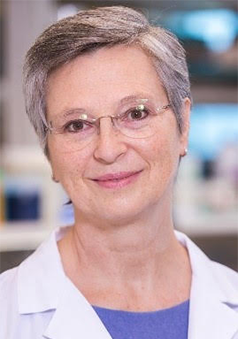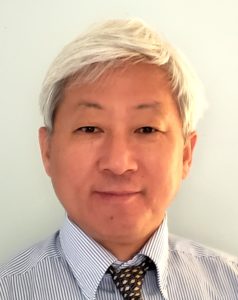Cancer-Host Interactions Program
Program Leaders
Program Overview
The goal of the Cancer-Host Interactions (CHI) Program is to improve cancer outcomes by better understanding how cancer-host interactions drive cancer progression and therapy resistance.
The CHI Program brings together members with expertise in the discovery and translation of mechanisms by which micro- and macro-environmental interactions between cancer and host promote cancer development and metastasis and yield novel therapeutic opportunities. The program builds on Georgetown Lombardi Comprehensive Cancer Center’s history of contributing key insights into oncogenesis, applications of endocrine and immunotherapy, and mechanisms of drug resistance.
Specific Aims
Three specific aims define the scientific goals of the Cancer-Host Interactions Program:
- Identify and target mechanisms whereby inflammation and other cancer-host cell interactions promote cancer emergence and progression. Members investigate how inflammation and cancer cell interactions with fibroblasts, adipocytes and endothelial cells in the hormonal milieu of the peritumor microenvironment, pre-metastatic and metastatic niches lead to greater cancer cell fitness to invade, survive and establish metastases. An emerging theme links the external and host microbial environments to applications in cancer.
- Identify mechanisms of immune cell regulation relevant to anticancer immunity and cancer treatment. This aim has emerged and expanded in scope with the recruitment of new program members with expertise in T-cell biology, cellular therapy and immuno-oncology, and brings together researchers aiming to enhance efficacy of immune therapy and stem cell transplantation.
- Therapeutically manipulate cancer–host cell interactions to overcome resistance and develop novel treatment approaches.
Program Features
With a portfolio of basic, translational, clinical, and population-based research, the CHI Program integrates member activities to fulfill the three Program Aims through intra- and inter-programmatic collaborations.
An overarching theme across all three aims is the interplay of cancer cells with host inflammatory and stromal cells, adipocytes and immune cells, and how these are influenced by host factors to limit current anticancer therapies.
CHI Program clinical investigators have a well-established portfolio of investigator-initiated trials, the majority of which grow from Georgetown Lombardi science involving clinical and basic CHI Program member collaborations.
Full Members
- Michael Atkins, MD, Deputy Director, Lombardi, Professor, Oncology, Medicine/GU, MGUH
- Maria Laura Avantaggiati, MD, Associate Professor, Oncology/GU
- Amrita Cheema, PhD, Professor, Oncology, Dept. of Biochemistry and Molecular and Cellular Biology/GU
- Sonia De Assis, PhD, Associate Professor, Oncology/GU
- Jigar V. Desai, PhD, Assistant Professor/Hackensack Meridian School of Medicine
- Rena Feinman, PhD, Associate Professor/JTCC
- Martha Gay, PhD, Assistant Professor, Medicine/GU
- Geoffrey Gibney, MD, Associate Professor, Medicine/GU, MGUH
- Andre Goy, MD, Professor, Oncology/GU, Director/JTCC
- Barry Hudson, PhD, Associate Professor, Oncology/GU
- Miriam T. Jacobs, MD, Assistant Professor, Medicine/GU
- Jennifer Kanakry, MD, Medical Director, Stem Cell Transplant and Cellular Immunotherapy Program, MedStar Health
- Samir Khleif, MD, Professor, Oncology/GU
- Chul Kim, MD, MPH, Assistant Professor, Medicine, Attending Physician, Heme/Onc/GU, MGUH, MWHC
- Marc Lippman, MD, Professor, Oncology/GU, MGUH
- Stephen Liu, MD, Associate Professor, Medicine/GU, MGUH
- Binfeng Lu, PhD, Professor/Hackensack Meridian School of Medicine
- Candace Mainor, MD, Assistant Professor, Medicine/GU
- David Perlin, PhD, Professor, Microbiology & Immunology/Hackensack Meridian School of Medicine, Professor, Oncology/GU
- G. William Rebeck, PhD, Professor, Neuroscience/GU
- Joshua Reuss, MD, Assistant Professor, Medicine/GU, Thoracic Medical Oncologist/MGUH
- Rachel Rosenstein, MD, PhD, Assistant Professor, Oncology/GU, Research Scientist/JTCC
- David Siegel, MD, PhD, Professor, Medicine/GU
- Joyce Slingerland, MD, PhD, Program Leader, Professor, Oncology/GU
- Jill Smith, MD, Professor, Medicine/GU, MGUH
- Shubhankar Suman, PhD, Assistant Professor/GU
- Alejandro Villagra, PhD, Associate Professor, Oncology/GU
- Benjamin Weinberg, MD, Associate Professor, Medicine/GU, MGUH
- Louis M. Weiner, MD, Director, Georgetown Lombardi and MGCI, Professor/Chair Oncology, Oncology, Medicine/GU, MGUH
- Anton Wellstein, MD, PhD, Professor/AD Basic and Translational Research/ Oncology, Pharmacology and Physiology, Medicine/GU
- Howard (Hai-Hui) Xue, MD, PhD, Research Scientist/JTCC, Professor/Hackensack Meridian School of Medicine
- Johannes Zakrzewski, MD, Associate Professor, Oncology/GU, Research Scientist/JTCC
- Yi Zhang, MD, PhD, Program Leader, Professor/Hackensack Meridian School of Medicine


